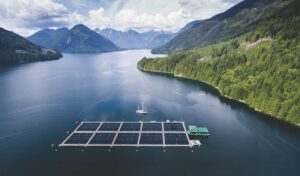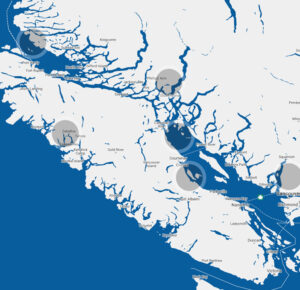Sustainable Salmon Aquaculture in BC
Fish farming in BC presents a complex mix of ecological, economic, and social factors. While the sector has contributed significantly to the regional economy and provided a vital protein source globally, concerns over its sustainability persist. Efforts to mitigate these concerns have led to advancements in technology and management practices, such as the use of clean technologies, improved waste management strategies, advancements in fish feed, proactive fish health management, and advances in managing sea lice. Additionally, third-party certifications like the Aquaculture Stewardship Council (ASC) and Best Aquaculture Practices (BAP) have been implemented to ensure adherence to rigorous sustainability standards, promoting responsible farming practices and transparency within the BC sector. The BC Salmon Farmers Association is at the forefront of communicating these initiatives across industry stakeholders, the government, and the public at large.

Environmental Sustainability & Fish Health
Salmon farming in British Columbia exemplifies a commitment to environmental sustainability and fish health, as demonstrated by rigorous industry standards and continuous innovation. Through responsible stewardship practices, such as site selection based on thorough environmental assessments and adherence to stringent regulations, salmon farmers prioritize minimizing ecological impacts while ensuring optimal conditions for fish health. Embracing technological advancements, including state-of-the-art ocean pen designs and integrated pest management strategies, the industry mitigates risks associated with disease outbreaks and habitat degradation. Moreover, proactive measures, such as regular monitoring and collaborative research initiatives with government agencies and academic institutions, underscore dedication to continuous improvement in environmental stewardship and fish welfare. By prioritizing sustainability in both environmental management and fish health, salmon farming in BC strives to maintain a delicate balance between meeting global seafood demand and preserving the pristine ecosystems of the region for future generations.
Economic Impact of BC Fish Farming
Fish farming in BC has a profound economic impact, contributing significantly to the province’s economy through job creation, revenue generation, and export opportunities. Salmon farming in the province supports about 6,000 jobs in coastal communities and contributes over $1.14 billion to the provincial economy annually. The sector supports various jobs, from aquaculture technicians to veterinarians to engineers, bolstering employment in coastal communities. Revenue generated from fish farming activities, particularly salmon farming, constitutes a substantial portion of the region’s agricultural exports, strengthening trade balances and contributing to overall economic growth. Moreover, fish farming operations often stimulate ancillary industries such as equipment manufacturing, transportation, and feed production, further amplifying their economic footprint in British Columbia.
About the BC Salmon Farmers Association
BC salmon farmers are committed to reconciliation, and all farms operating in BC are currently done in agreement, negotiation, or established partnerships with First Nations in whose territories we operate. These agreements are founded upon recognizing First Nations’ right to exercise jurisdiction over the land, resources, and waters within their territories.
Farm-raised salmon generates over $1.14 billion for the provincial economy, supporting thousands of jobs. Additionally, farm-raised salmon provides a nutritious and sustainably produced protein with a low carbon footprint that contributes to Canada’s food security and Blue Economy.
The BC Salmon Farmers Association represents over 60 businesses and organizations throughout the value chain of finfish aquaculture in BC. Our members account for over 95% of the annual provincial harvest of farm-raised salmon in British Columbia.
